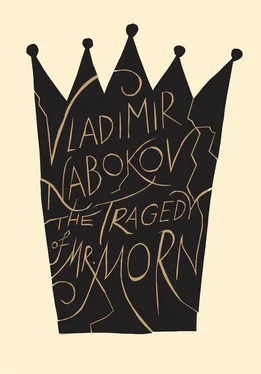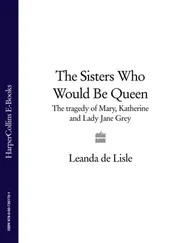We have throughout resisted all temptations to tame or normalize Nabokov’s language, which often sounds as distinctive and peculiar in Russian as in our translation—or, for that matter, as in Nabokov’s own English. Indeed, there are moments in the text where we were able to draw on Nabokov’s own translation of a phrase. So, for instance, when Midia has left Morn, he uses the curious phrase letuchii dozhd’ —literally, “flying rain.” We might have been tempted to make this “fleeting rain,” were it not for the fact that one of Nabokov’s first poems, from 1917, is entitled “Dozhd’ proletel,” which Nabokov himself translated as “The Rain Has Flown,” adding in a note printed in Poems and Problems (1970) that “The phrase letit dozhd’ , ‘rain is flying,’ was borrowed by the author from an old gardener (described in Speak, Memory , Chapter 2 et passim ) who applied it to light rain soon followed by sunshine.” In the opening speech of the play, we have sought to preserve Tremens’s warlock-like tones and his elliptical, highly compressed images. So, too, when Ella in the same scene addresses the coals burning in the fireplace, she uses a strange and archaic phrase— “Chur—goret’!” —which we have translated by a phrase equally strange and archaic: “Fain burn!” ( I.i.). In this case we were influenced by the modern associations of the word “fain” with Shakespeare. In his translation of Pushkin, Nabokov often sought out the phrases in such poets as Byron which Pushkin had reworked into Russian; we have done the same in trying to retain the shimmering pale fire of Shakespeare’s language which is often glimpsed in Nabokov’s original Russian. This Shakespeareanism is always dominant but it often in turn absorbs and transforms the echoes of other literary exemplars, so that in Dandilio the terse aphorisms of a Voltaire or a Pope acquire Shakespearean vividness and whimsy, a richness of imagery which, conversely, deepens the fractured, syntax-defying Futurist speeches of Klian. In short, the play contains a range of registers and discourses, often overlain, and we have had to try to reproduce this in our translation.
In a few, though not very many, instances, we have permitted ourselves to travel a fair way beyond the original Russian, where reproducing it would have resulted in entirely the wrong feel and tone, though always with the intention of expressing the essential meaning. In Act II, Tremens declares: “Segodnia otkryvaiu/moi nebyvalyi prazdnik” —literally, “Today, I will open [or, inaugurate]/my unprecedented [or, fantastic] festival [or, holiday].” Any combination of these possibilities in English would have sounded clumsy and silly; at least as importantly, none of the words in English capture the full semantic range of the Russian words, especially nebyvalyi , which dictionaries translate as “unprecedented” and “fantastic.” “Fantastic” was out because it has come in modern English to mean something excellent and admirable. What was needed was a word which would express the idea of a revolutionary rupture in history, and an element of the improbable. We finally landed on “monstrous,” which derives from the Latin monstra —nature- and history-rending portents, of the kind Tremens himself embodies. Likewise, “festival” and “holiday” both carry excessively positive and pleasurable connotations which do not do justice to prazdnik in this context. “Carnival,” we felt, with its hints of flesh and anarchy, would complement the animal idea of the “monstrous” while contrasting with its implication of the unprecedented; just as, in the Russian, there is a paradox latent in the idea of a prazdnik , usually an annual festival, being nebyvalyi —unprecedented. We therefore arrived at our solution: “Today I shall unleash my monstrous carnival” ( II.).
A smaller example comes from the final scene of the play, in which Morn says that the crowd does “not know that the poor Eastern bride/is barely alive beneath her tasselled weight” ( V.ii.), where “tasselled weight” stands for tiazhest’iu kosmatoi , which would more literally be translated as “shaggy weight.” Not only would “shaggy” have sounded comical, it would have made an obscure passage still more unclear: Morn here is looking for a female parallel to the image, in his previous speech, of a knight who seems glorious to the crowd but is hot and sweaty inside his armour (as Morn is dying within the prison of his fairy tale). The “Eastern bride” looks beautiful to the crowd but is suffocating within her heavy ornamental marriage robes. By “tasselled” we sought to translate kosmatoi in a way that would make this idea, if not obvious, at least accessible.
All our work was, however, doubled, if not tripled, by the demands of translating Nabokov’s pentameter line. It was essential that Morn , with its high tragic ambition, remain a verse-play, but we soon decided against trying to reproduce Nabokov’s own fairly strict iambic pentameter. It would have been impossible to do so without straying a long way from our primary goal of reproducing Nabokov’s own nuances of sense. We opted instead for a loose five-stress line, evaluating the total rhythmic pattern of the line according to where the stresses seemed to us naturally to fall, in context. We have also tried if at all possible to pay respect to the integrity of each individual line and to avoid meaningless line-endings and awkward enjambments. Therefore we have not simply broken each line after ten or eleven syllables, and have looked to create lines whose beginnings, endings, and progressive syntactic pattern are part of their poetic meaning.
We feel, nevertheless, that we have achieved a steady beat throughout the play, and we have tried to make the rhythms relevant to the sense and tenor of a particular speech. As is, indeed, the established practice of English pentameter, the ear will, once it is accustomed to the five-stress pattern, hear lines as five stresses even where they are a syllable or two over or under the established measure. Such “hypermetric” syllables are common in Shakespeare. In the case of split lines, we have allowed ourselves greater liberty—as also with lines ending with an ellipsis (three dots), where the idea is that the line should seem to trail off, so that there is a good reason for a stress to go missing. Some characters’ speeches, especially those of Dandilio and Tremens, the play’s two most grandiloquent orators, seemed naturally to unfold into many-syllabled lines which verge on the hexameter—appropriately, perhaps, in a play which gestures towards a lost grandeur. Ganus thinks of the vanished King, saying that
…His footsteps
linger in the palace, like the step of a hexameter
dwindling in one’s memory…
( III.ii.)
Contrastingly, when Morn is reduced by his cowardice to the lowly state of a bourgeois “mister,” he muses that
…I, I am Mister Morn—
that is all; an empty space, an unstressed
syllable in a poem without rhyme.
( IV.)
Such a slackening of rhythmic pressure characterizes the speeches of characters when they drop out of the high heroic mode; and we have attempted to capture this Shakespearean contrast of prosody and prose.
Lastly, a word on the edition we have translated. Morn survives in a typewritten copy and in a handwritten fair copy; neither is entirely complete, with a few passages missing in Act V. These texts were edited together by Serena Vitale and Ellendea Proffer for the 1997 Zvezda edition, and re-edited by Andrei Babikov for the 2008 Azbuka edition. It is this latter edition on which our translation is based.
Читать дальше










